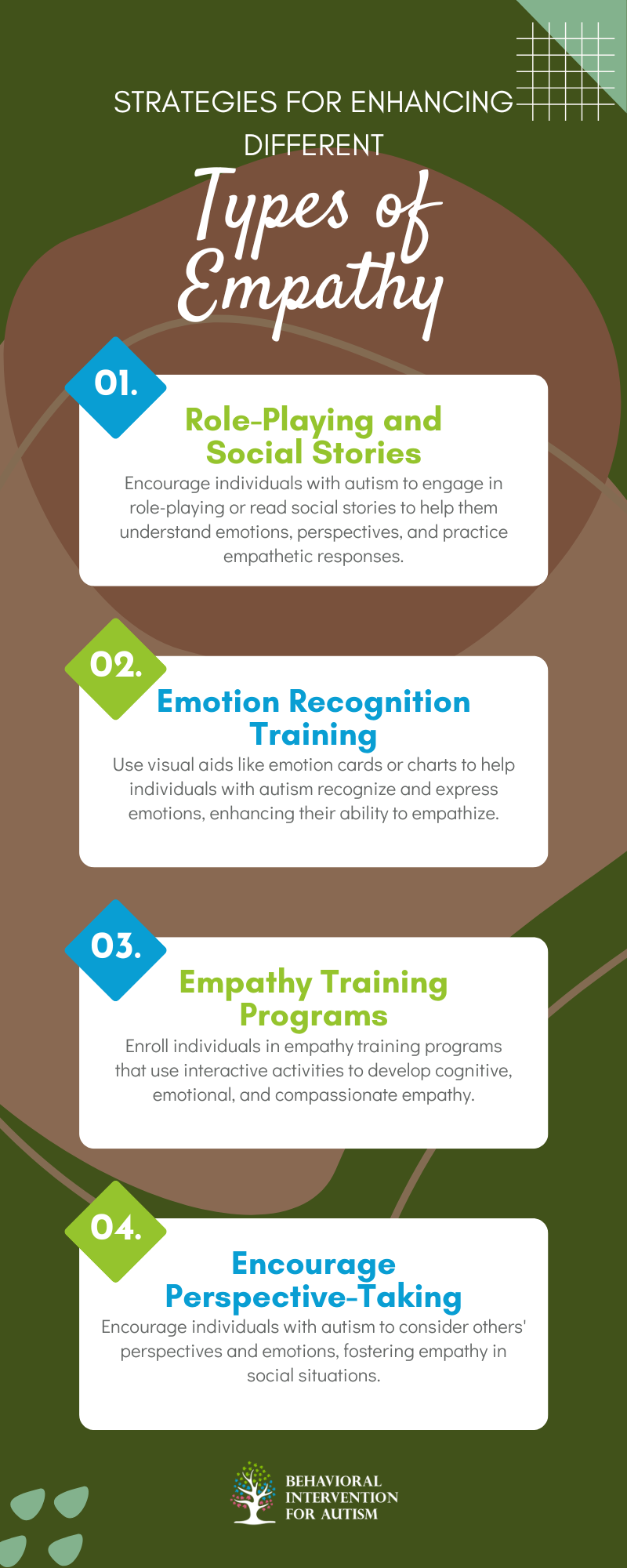
Table of Contents
Empathy plays a crucial role in fostering understanding and connection within the autism community. By delving into the significance of empathy in individuals with autism and exploring the different types of empathy prevalent in this community, we can enhance our appreciation of diverse perspectives and experiences.
Importance of Empathy in Individuals with Autism
Empathy is particularly vital for individuals with autism as it enables them to recognize and understand the emotions, thoughts, and feelings of others. Developing empathy not only enhances social interactions and relationships but also promotes emotional intelligence and self-awareness. By cultivating empathy, individuals with autism can navigate social situations more effectively and build meaningful connections with others.
In the autism community, empathy manifests in various forms, each contributing uniquely to social interactions and emotional understanding. Understanding the different types of empathy prevalent in the autism community can offer insights into the diverse ways individuals with autism connect with and relate to others.
Cognitive Empathy
Understanding cognitive empathy is essential when discussing empathy in the autism community. This form of empathy involves the ability to identify and understand the thoughts, perspectives, and emotions of others, even if one may not personally experience those feelings.
Definition and Characteristics
Cognitive empathy, also known as perspective-taking, is the capacity to comprehend and predict the mental states of others. Individuals with autism spectrum disorder (ASD) may experience challenges in recognizing and interpreting social cues, which can impact their cognitive empathy skills. However, with appropriate support and intervention, individuals with autism can enhance their cognitive empathy abilities.
Challenges and Strengths
Challenges of Cognitive Empathy in Autism | Strengths of Cognitive Empathy in Autism |
Difficulty interpreting non-verbal cues, such as facial expressions and body language | Ability to analyze situations logically and objectively |
Struggles with understanding sarcasm, metaphors, and indirect communication | Capacity to offer practical solutions and advice based on factual information |
Challenges in accurately comprehending the perspectives of others | Tendency to approach problem-solving with a unique perspective and attention to detail |
Emotional Empathy
In the realm of empathy within the autism community, emotional empathy plays a significant role. Understanding the definition and characteristics, as well as the challenges and strengths associated with emotional empathy, is crucial for caregivers and individuals involved in supporting those with autism.

Definition and Characteristics
Emotional empathy involves the ability to sense and share the emotions of others, connecting on a deeper level emotionally. Individuals with autism who exhibit emotional empathy can understand and resonate with the feelings of those around them, fostering meaningful relationships and interactions.
One key characteristic of emotional empathy is the capacity to recognize and respond to the emotions expressed by others, demonstrating sensitivity and compassion in social situations. This type of empathy enables individuals with autism to show understanding and support to their peers and loved ones.
Challenges and Strengths
While emotional empathy can enhance social connections and emotional intelligence, individuals with autism may face challenges in accurately interpreting and expressing emotions. The nuanced nature of emotional cues and non-verbal communication can pose difficulties for some individuals, impacting their ability to fully grasp the feelings of others.
On the flip side, strengths associated with emotional empathy in the autism community include sincerity in emotional responses and a genuine desire to connect with others on an emotional level. By embracing and nurturing emotional empathy, individuals with autism can cultivate authentic relationships and contribute positively to their social environment.
Compassionate Empathy
Compassionate empathy is a crucial aspect of understanding the emotional experiences of individuals with autism. This form of empathy goes beyond recognizing emotions; it involves actively feeling and showing compassion towards others’ feelings. Let’s delve into the definition and characteristics of compassionate empathy, as well as the challenges and strengths associated with it within the autism community.

Definition and Characteristics
Compassionate empathy is characterized by the ability to empathize with others by not only understanding their emotions but also responding with kindness, support, and a desire to alleviate distress. Individuals who possess compassionate empathy demonstrate a genuine concern for the well-being of others, especially during times of difficulty or emotional upheaval.
Those with compassionate empathy in the autism community may show a deep understanding of others’ emotions, even if they struggle to express their own feelings verbally. They often exhibit a strong sense of altruism and may go out of their way to comfort or help someone in need, emphasizing connection and support.
Challenges and Strengths
While compassionate empathy is a valuable trait, individuals with autism may face challenges in expressing their empathy due to difficulties in interpreting social cues or understanding subtle emotions. They might find it overwhelming to navigate complex social interactions and respond appropriately in emotional situations.
However, individuals with autism who possess compassionate empathy bring unique strengths to relationships and communities. Their sincerity and genuine concern for others can foster deep connections and create a supportive environment for those around them. This form of empathy can lead to meaningful relationships and contribute to building a more inclusive and understanding society.
Understanding and fostering compassionate empathy in individuals with autism is essential for promoting empathy and compassion within the autism community and beyond. By recognizing and appreciating their unique way of empathizing, we can create a more empathetic and inclusive environment for all individuals, regardless of neurodiversity.
Practical Empathy
Practical empathy plays a crucial role in fostering understanding and connection within the autism community. This type of empathy involves the ability to comprehend and respond to the practical needs and challenges faced by individuals with autism. Let’s explore the definition, characteristics, challenges, and strengths associated with practical empathy.

Definition and Characteristics
Practical empathy encompasses the capacity to recognize the specific needs and difficulties that individuals with autism may encounter in their daily lives. It involves actively listening, observing, and responding to practical concerns, such as sensory sensitivities, communication barriers, and routine preferences. Practicing practical empathy allows caregivers and individuals within the autism community to offer tailored support and accommodations that enhance overall well-being and quality of life.
Challenges and Strengths
While practical empathy is instrumental in promoting inclusivity and support for individuals with autism, it also presents its own set of challenges. Understanding and addressing the diverse practical needs of individuals with autism requires patience, creativity, and flexibility. Caregivers and community members may encounter challenges in accurately identifying and responding to these needs, leading to potential frustrations and misunderstandings.
On the other hand, the strengths of practical empathy lie in its ability to foster meaningful connections and foster a sense of empowerment within the autism community. By actively engaging with the practical concerns of individuals with autism, caregivers and peers can build trust, enhance communication, and create environments that cater to diverse needs. Through collaborative efforts and a proactive approach to practical empathy, individuals with autism can thrive in various settings and experiences.
Developing Empathy in Individuals with Autism
Empathy plays a crucial role in social interactions and relationships, especially for individuals within the autism community. Developing empathy in individuals with autism can enhance their understanding of emotions and perspectives, leading to improved communication and connection with others. We will examine strategies to enhance various types of empathy and the resources available to support individuals with autism in building empathy.

Support and Resources for Building Empathy
Resource | Description |
Therapy Services | Seek out ABA therapy or counseling services that specifically target empathy development in individuals with autism. Therapists can provide tailored strategies and interventions to enhance empathy skills. |
Support Groups | Join local or online support groups for parents and caregivers of individuals with autism. These groups offer a supportive environment to share experiences, learn from others, and access resources related to empathy development. |
Educational Materials | Utilize books, articles, and online resources that focus on empathy-building activities and techniques for individuals with autism. These materials can provide valuable insights and practical tips for fostering empathy. |
Community Programs | Explore community programs and workshops that promote social skills development and empathy-building in individuals with autism. These programs often offer group activities and social interactions to enhance empathy in a comfortable setting. |
Implementing these strategies and accessing relevant support and resources can help individuals with autism strengthen their empathy skills in cognitive, emotional, compassionate, and practical domains. Building empathy enhances social interactions and fosters a deeper understanding and connection with others both within the autism community and beyond.
Empathy can manifest in various ways among individuals with autism, influencing how they relate to others and navigate social interactions. Understanding the different types of empathy—cognitive, emotional, and compassionate—can help us provide better support and interventions tailored to each person’s needs.
At Behavioral Intervention for Autism, we offer comprehensive ABA programs in Florida that focus on enhancing social skills and emotional understanding. Our dedicated team is committed to delivering high-quality, personalized services designed to foster meaningful connections and promote personal growth. If you want to explore how our programs can benefit your loved one, please reach out to us today!
- 9 Common Obsessions of Children With Autism You Should Know - February 25, 2025
- What is Neurodiversity? A Guide to Embracing Differences - February 25, 2025
- Understanding Hyperfocus in Autism: What It Means and Why It Happens - February 25, 2025
